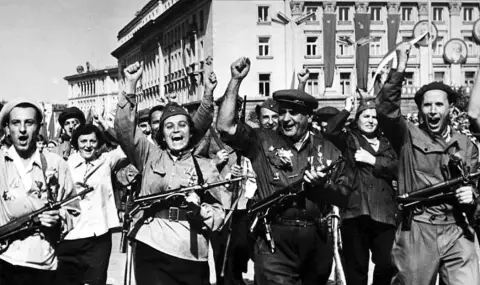On September 9 In 1944, a coup was carried out in Sofia. This is Kimon Georgiev's last coup. Before that, he participated in the change of power on June 9, 1923 and May 19, 1934.
At 6:25 a.m. on September 9, 1944, the new prime minister Kimon Georgiev read a previously prepared Proclamation to the Bulgarian people on the radio and announced the composition of the new cabinet. Shortly after that, the regents Kiril and Nikola Mihov were brought to him from Chamkoria, and the third regent Bogdan Filov was in the province. They sign a decree appointing the government, after which they are arrested. Among the government's first steps is to appoint loyal officers to key posts in the army.
The entire Bulgarian army supports the coup and declares itself in the service of the new government.
Everywhere the military commanders arrest the police and together with partisan units repress the inconvenient.

The army headquarters issued an order to liquidate all enemies of the new government who attempted to resist and refused to surrender voluntarily to the military and militia authorities. The official name of the army was renamed from Bulgarian Army to Bulgarian People's Army – abbreviated BNV and in it, among other command posts, the position of the assistant commanders for the political affairs of the army is created.
On September 9, by order of Dobri Terpeshev, all partisan formations came down from the mountains and together with the army took power in the villages and cities in Bulgaria and by order of the Minister of War, General Damyan Velchev, and works already under General Dobri Terpeshev, the partisan units flow into the Bulgarian army and create military guard units named Bulgarian National Guard, and an army guard company is created for each military unit, which have both military-political and military police functions.
Everywhere, the seizure of power takes place without resistance, but in other cases some small military and police units give it to other large military units and the forces of the OF, but the resistance is broken.
According to various estimates, the number of people killed during this period is between 20,000 and 40,000 people. Those sentenced to death by the People's Court are 2,730 people - ministers, deputies, journalists, bankers, mayors, priests, landowners, teachers.
The beginning of the coup was set in the middle of August 1944. On August 26, under the threat of the advancing Red Army in Romania, the government of Ivan Bagryanov announced Bulgaria's neutrality in the war. It ordered that the German troops leave the country, and that those who refuse be disarmed.
On the same day, August 26, the Central Committee of the BRP issued District No. 4, with which it set the task of seizing power in Bulgaria by means of an armed uprising. At the same time, the government began in Egypt separatist peace negotiations with England and the USA, hoping to bring about the placement of British and American troops in Bulgaria.
These attempts met with resistance from the Soviet Union, which led to the failure of negotiations and on September 2, Bagryanov stepped down to allow a new government to be formed as a last ditch effort to prevent a Soviet advance against Bulgaria.
On September 2, a new government was formed, a coalition of the main opposition and anti-German parties, headed by Konstantin Muraviev.
The Fatherland Front was offered four seats in this cabinet, but it refused participation, actively preparing for a military coup. The new government continues its attempts at foreign policy reorientation, ending the alliance with Germany on September 4, starting the disarmament of the German troops on the territory of the country and releasing the political prisoners.
On the same day, German troops captured the headquarters of the Bulgarian corps in Niška Banya and the headquarters of the Bulgarian divisions occupying Serbia.
On September 5, Muraviev's government discussed a decision to declare war on Germany. However, its promulgation was postponed for 72 hours at the request of the Minister of Defense, General Ivan Marinov, due to tactical problems. In fact, gen. Marinov had already coordinated his actions with the Patriotic Front to enable the USSR to declare war on Bulgaria in the meantime. In return for the service, after the coup, Ivan Marinov was appointed commander-in-chief of the Bulgarian army.
Under these circumstances, on September 5, the Soviet Union declared war on the Kingdom of Bulgaria. At 6 – On September 7, in the absence of power, riots began in various parts of Bulgaria. In Varna and Burgas, the Patriotic Front established control over the administration shortly before the arrival of the Soviet troops. On September 6, a strike was announced for the tram workers in Sofia, the government subjected them to mobilization, and the next day their demonstration was dispersed, during which one person was killed.
On September 7, the prisons in Silistra and Pleven were attacked and the prisoners were released, and 6 people were killed when a miners' demonstration was dispersed in Pernik.
The coup is less than 48 hours away...
